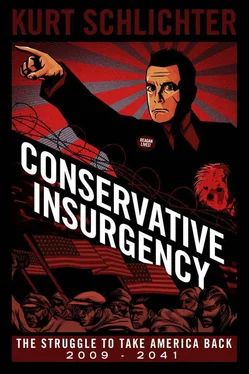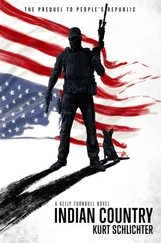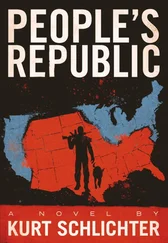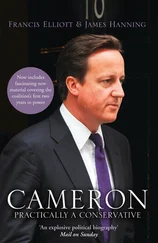Kurt Schlichter - Conservative Insurgency
Здесь есть возможность читать онлайн «Kurt Schlichter - Conservative Insurgency» весь текст электронной книги совершенно бесплатно (целиком полную версию без сокращений). В некоторых случаях можно слушать аудио, скачать через торрент в формате fb2 и присутствует краткое содержание. Год выпуска: 2014, ISBN: 2014, Издательство: Post Hill Press, Жанр: Социально-психологическая фантастика, humor_satire, на английском языке. Описание произведения, (предисловие) а так же отзывы посетителей доступны на портале библиотеки ЛибКат.
- Название:Conservative Insurgency
- Автор:
- Издательство:Post Hill Press
- Жанр:
- Год:2014
- ISBN:978-1-61868-977-1
- Рейтинг книги:5 / 5. Голосов: 1
-
Избранное:Добавить в избранное
- Отзывы:
-
Ваша оценка:
- 100
- 1
- 2
- 3
- 4
- 5
Conservative Insurgency: краткое содержание, описание и аннотация
Предлагаем к чтению аннотацию, описание, краткое содержание или предисловие (зависит от того, что написал сам автор книги «Conservative Insurgency»). Если вы не нашли необходимую информацию о книге — напишите в комментариях, мы постараемся отыскать её.
Conservative Insurgency
Conservative Insurgency — читать онлайн бесплатно полную книгу (весь текст) целиком
Ниже представлен текст книги, разбитый по страницам. Система сохранения места последней прочитанной страницы, позволяет с удобством читать онлайн бесплатно книгу «Conservative Insurgency», без необходимости каждый раз заново искать на чём Вы остановились. Поставьте закладку, и сможете в любой момент перейти на страницу, на которой закончили чтение.
Интервал:
Закладка:
On the macro side, the insurgency targeted media and entertainment—or, more accurately, members of the insurgency gravitated to media and entertainment organically. Developments in technology meant that participation in media and entertainment was no longer restricted to large, well-funded corporations. Even individuals could create media products and, just as importantly, distribute them to consumers.
Moreover, conservatives themselves stopped self-selecting against careers in the media and entertainment industries. They now went into those fields, expecting to compete even in the face of prejudice by the entrenched elite. As it became obvious that the sexism and racism attributed to conservatives was mere slander, the artificial social barriers to entry into the cultural industries fell. Conservatives began to be seen as regular people again. No longer could they be dismissed as sexist, racist, or homophobic and thereby be marginalized and ignored.
At the same time, these industries were facing more competition for customers and could no longer afford to contemptuously ignore the huge potential market that expressly conservative Americans represented. In the Obama years, Hollywood tentatively explored appealing to these customers, starting with reality shows. When a television program about a real-life family of bearded, backwoods, explicitly Christian hunters called Duck Dynasty set viewing records in the early 2010s, the industry took notice.
Soon, even the traditional networks were running shows where the explicitly conservative characters were the heroes and liberals were the butts of the jokes. In music, books, theater, and art, artists took tentative steps to reappraise traditional values and even embrace them. Americans, faced with their own experience of liberal failure, were receptive. But there was a brutal cultural backlash—old outlets like the New York Times savaged any dissent from liberal dogma when it could not ignore it. Yet the market for dissent was there, and as the failure of liberalism became more self-evident, one could see the late-night comics aiming their wit at Obama and Clinton with ever-increasing intensity. The cultural consensus, inspired in large part by liberalism’s manifest failure, slowly changed to first accept conservatism, then embrace it.
The insurgents locked in their victories. Marlowe—aided by the strong majorities in Congress that had come from the insurgent ground game (an organizational campaign facilitated by the technological mastery of many new adherents)—acted with an aggressiveness that stunned the liberal establishment. Obamacare had alienated millions of Americans with both its substantive failure and the government’s shameful abuse of the private medical information it held to embarrass the administration’s foes. Though many establishment Republicans had given up on ever repealing Obamacare, signing its repeal was one of Marlowe’s first acts.
And she replaced it with… nothing. Conservatives felt that the federal government had no business in the health care field, and they acted on that principle. They offered no “alternative.” The insurgents upended the paradigm by refusing to remain within the envelope the establishment had defined.
Firmly in control of the federal government, the constitutional conservatives repealed a mass of other additional health care statutes and regulations as well, and left it to individuals (and individual states, if they chose) to take responsibility for their health care in a free market. The market responded with a tsunami of new options. Some people without health insurance chose to be without it, instead wanting to pay cash, while others unwisely risked the consequences of forgoing coverage knowing that they were on their own.
Next, Marlowe and her Congress proceeded to gut the rest of the welfare state, slashing those programs they did not entirely eliminate. They bombed the rubble of the liberal establishment.
This return to personal responsibility culminated in the ratification of the Thirty-Second Amendment, which placed the responsibility for each individual’s self-support unequivocally upon the individual himself. The insurgents (who still felt themselves fighting a lonely battle against the establishment even though they now held the reins of power) were not content to just prune the branches of the tree but instead, as one exasperated liberal senator put it, “dig out the roots and sow the ground with salt.” The size of government at the end of Marlowe’s second term, in actual dollars, was just over half the size of when she took office—and that took into account her massive rebuilding of America’s shamefully degraded military.
The Obama and Clinton administrations had taught the insurgents a lesson that more traditional conservatives found difficult to accept—a disregard for old norms and traditions that would restrain their actions. They had attempted to evade GOP power in the Congress through executive orders; now, Marlowe used the same executive power remorselessly to dismantle the bureaucracy and impose her will. Liberals, frustrated by filibusters that obstructed their initiatives, had repealed the ancient senatorial rule years before; insurgents now gleefully passed dozens of bills that gutted liberal programs while liberals watched helplessly. Their passionate speeches full of renewed fear of majoritarian rule were met with howls of laughter.
They had handed the conservatives the sword that slew the liberal welfare state.
But the raw exercise of unconstrained power in a democratic republic is hardly conservative. The insurgency’s stated goal was always to return to the Founders’ ideal, but the realities of the battle it faced required putting off that restoration. Even today, the norms and customs that preceded the Obama administration have not been completely restored. A generation of conservatives has arisen that never experienced them; they largely know only political/cultural warfare in which principle does not always take priority over expedience.
Marlowe’s “conservative court packing” illustrated the challenge. Faced with a liberal Supreme Court, Marlowe did not hesitate—not even for a second—to drive the impeachment of three liberal justices so she could pack the Court with insurgent jurists. She did the same in lesser courts—Obama had overseen the end of the filibuster to create a majority on the Court of Appeals for the District of Columbia Circuit, and Marlowe engineered a scheme to repack it by adding 10 new seats.
These, and other similarly aggressive actions, brought howls of outrage from liberals. A few more traditional conservative voices objected, but in vain. Sixteen years of facing ruthless aggression by the Obama and Clinton administrations had left the insurgents utterly indifferent to their objections and pleas for mercy.
Liberals made politics a zero-sum blood sport but forgot that the rules would apply to their opponents when they got the ball. It remains to be seen how well the insurgents have learned the same lesson.
Today, America defines itself as a “conservative” nation, but it is a different conservatism than the one that existed in 2008. Gone are many of the issues that fueled the national debate back then. Gay Americans are accepted with little or no thought to their orientation. Abortion, though still occasionally bubbling up to cause rifts between conservatives, was essentially papered over by being punted to the states. Marijuana is legal (though scorned by most American as hopelessly tacky), while laws regarding more serious drugs are much less severe. Women operate at the highest levels of the GOP without comment; in fact, women were at the forefront of the insurgency. The ubiquitous charges of racism hurled by liberals lack potency where a slim majority of Americans (including conservatives) classify themselves as “multiracial.”
Читать дальшеИнтервал:
Закладка:
Похожие книги на «Conservative Insurgency»
Представляем Вашему вниманию похожие книги на «Conservative Insurgency» списком для выбора. Мы отобрали схожую по названию и смыслу литературу в надежде предоставить читателям больше вариантов отыскать новые, интересные, ещё непрочитанные произведения.
Обсуждение, отзывы о книге «Conservative Insurgency» и просто собственные мнения читателей. Оставьте ваши комментарии, напишите, что Вы думаете о произведении, его смысле или главных героях. Укажите что конкретно понравилось, а что нет, и почему Вы так считаете.












